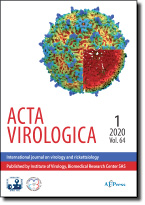Acta Virologica Vol.66, No.2, p. 186 – 191, 2022
|
| Title: Rapid detection of sweepoviruses through lateral flow dipstick-based recombinase polymerase amplification |
| Author: He Wang, Xiukun Yang, Decai Tuo, Yonghua Liu, Peng Zhou, Wentao Shen, Guopeng Zhu |
|
Abstract: Sweepoviruses represent a phylogenetic group of begomoviruses that cause significant sweet potato (Ipomoea batatas) production losses in various countries across the world. For rapid identification of sweepoviruses, we developed a technique based on isothermal recombinase polymerase amplification in conjunction with lateral flow dipsticks (RPA-LFD). The optimum reaction conditions for the RPA were 20 min incubation at 37°C. The RPA-LFD specifically detected distinct sweepovirus species, with no other viruses infecting sweet potato causing a cross-reaction. The detection limit of the RPA-LFD was 1.0×104 copies of the target DNA molecule per reaction, and it exhibited a 10-fold greater sensitivity than the conventional PCR. Furthermore, when coupled with an alkaline polyethylene glycol-based crude genomic DNA extraction, the entire procedure was completed in 30 min without the use of any special instruments other than a water bath. Therefore, the RPA-LFD technique is a potential sweepovirus diagnostic tool that can be used in the field with fewer available resources.
|
|
| Keywords: detection; sweepoviruses; recombinase polymerase amplification; lateral flow dipstick |
|
|
Published online: 29-Jun-2022
|
| Year: 2022, Volume: 66, Issue: 2 |
Page From: 186, Page To: 191 |
doi:10.4149/av_2022_208
|
|
 download file download file |
|
|
|
|
 download file
download file
